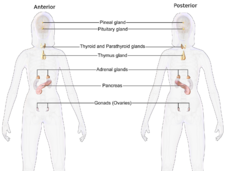Endocrinopathies

Illustration depicting the primary endocrine organs of a female
|
|
| System | Endocrine |
|---|---|
| Significant diseases | Diabetes, Thyroid disease, Androgen excess |
| Significant tests | Thyroid function tests, Blood sugar levels |
| Specialist | Endocrinologist |
| Occupation | |
|---|---|
| Names | Doctor, Medical specialist |
|
Occupation type
|
Specialty |
|
Activity sectors
|
Medicine |
| Description | |
|
Education required
|
|
Endocrinology (from Greek , endon, "within"; , krīnō, "to separate"; and , ) is a branch of biology and medicine dealing with the endocrine system, its diseases, and its specific secretions known as hormones. It is also concerned with the integration of developmental events proliferation, growth, and differentiation, and the psychological or behavioral activities of metabolism, growth and development, tissue function, sleep, digestion, respiration, excretion, mood, stress, lactation, movement, reproduction, and sensory perception caused by hormones. Specializations include behavioral endocrinology and comparative endocrinology.
The endocrine system consists of several glands, all in different parts of the body, that secrete hormones directly into the blood rather than into a duct system. Hormones have many different functions and modes of action; one hormone may have several effects on different target organs, and, conversely, one target organ may be affected by more than one hormone.
Endocrinology is the study of the endocrine system in the human body. This is a system of glands which secrete hormones. Hormones are chemicals which affect the actions of different organ systems in the body. Examples include thyroid hormone, growth hormone, and insulin. The endocrine system involves a number of feedback mechanisms, so that often one hormone (such as thyroid stimulating hormone) will control the action or release of another secondary hormone (such as thyroid hormone). If there is too much of the secondary hormone, it may provide negative feedback to the primary hormone, maintaining homeostasis.
...
Wikipedia
